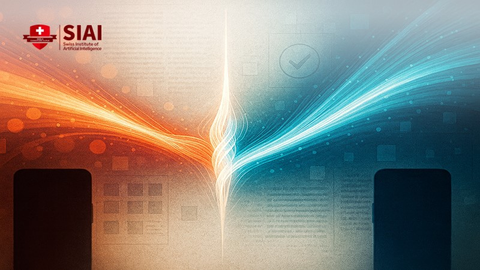[해외 DS] 잊혀진 사용자 편의성, AI로 위기 모면할 수 있을까
입력
수정
사용자 편의성 보다 '성장'이 우선 추천 시스템이란 탈을 쓴 통제 수동적이고 단일적인 사고에 갇힐 수도
[해외DS]는 해외 유수의 데이터 사이언스 전문지들에서 전하는 업계 전문가들의 의견을 담았습니다. 저희 데이터 사이언스 경영 연구소 (GIAI R&D Korea)에서 영어 원문 공개 조건으로 콘텐츠 제휴가 진행 중입니다.

역사상 가장 인기 있는 소비자 제품 중 하나인 아이폰에서 깔끔한 사용자 인터페이스를 더 이상 찾아볼 수 없다. 새 아이폰에는 38개의 앱이 사전 설치되어 있으며, 즐겨 사용하는 개인 금융, 소셜 미디어 및 생산성 앱을 내려받으면 이제 46개가 넘어간다. 모든 항목에 대해 별도의 폴더와 레이블을 신중하게 만들지 않는 한, 사용자는 홈 화면에만 의존할 수 없게 됐다. '설정' 앱은 다양한 앱과 기능이 미로처럼 얽혀 있고, 알파벳순으로 정리되어 있지도 않으며, 각 옵션은 더 많은 옵션으로 이어져서 원하는 기능을 찾기 쉽지 않은 실정이다.
지저분한 디자인과 늘어난 검색 비용을 보완하기 위해 애플은 AI 기반 검색 엔진 'Spotlight' 기능을 지원한다. 다른 기업들도 마찬가지로 인공 지능의 '혁신'은 새로운 것을 창조하거나 혁명적인 것이 아니라 무분별한 개발로 잃어버린 주 기능을 되찾기 위한 궁여지책이다.
사용자 편의성에 관심 없어, 매출 올리기 급급한 앱 마켓
2007년부터 검색 시장의 선두 주자인 구글은 검색의 의미를 서서히 약화해 왔다. 관련성이 높은 검색 결과가 아니라 검색 엔진에 최적화된 콘텐츠 혹은 광고 게시물로 도배하고 사용자가 답을 찾는 것을 방해했다. 이제 사용자는 구글 검색 문장에 '+Reddit' 또는 기타 우회적인 방법을 통해 구글을 속여야 하는 우스꽝스러운 상황에 직면했다. 구글은 생성형 AI를 사용하여 검색 결과를 요약해 주는 AI 스냅숏 검색(Search Generative Experience) 서비스를 제공하고 있다. 인공지능으로 새로운 검색 경험을 선사하리라는 홍보의 이면엔 망가진 검색 기능을 봉합하려는 의도가 숨겨져 있다.
현대의 기술 기업(특히 상장 기업)은 더 나은 제품이나 더 유용한 서비스를 제공하는 것이 아니라 끝없이 확장하는 데 관심이 있다. Apple 뉴스, Apple 음악, Apple 피트니스, Apple TV+가 각각 고유한 알림과 팝업 세트를 갖추게 된 이유다. 이러한 앱과 다양한 설정이 사용자 경험을 계속 침식하더라도 앱스토어 매출(2022년 약 1,452조 원)을 늘리기 위해 애플은 사용자가 휴대폰에 설치하는 앱의 수를 줄이는 데는 관심이 없다. 결과적으로 애플 디바이스의 앱 개수는 증가하고 찾기 어려워지며 속수무책으로 인공 지능에 의존하게 되는 구조가 형성된다. 유능한 앱을 많이 내려받는 것은 아무런 문제가 없다. 하지만 한 조사에 따르면 사용자들은 모바일에 설치된 80개의 앱 중 평균적으로 9개의 앱만 지속해서 사용한다. 앱의 리텐션율이 낮은 이유 중 가장 눈에 띄는 원인은 사용자가 앱에 대한 호기심이 급증했다가 앱이 상상했던 목적에 부합하지 않으면 흥미를 잃기 때문이라고 전했다. 호기심을 자극하기 위한 과대광고와 낮은 제품 퀄리티를 방관하는 애플의 방만을 방증하는 부분이다.
도둑맞은 자율성, 기업의 조작에 점점 취약해
알렉사(Alexa)와 시리(Siri)는 의식적이고 의도적인 디지털 경험을 대체하고 있다. 이 두 서비스는 명령을 음성 인터페이스로 통합하여 편리하지만 "우리가 할 수 있는 일"을 "아마존이나 애플이 허용하는 일"에 종속시키는 결과를 낳았다. Siri나 Alexa에서 무언가를 검색하면 애플과 아마존이 결과를 제어한다. 이들은 사용자가 원하는 검색 결과를 제공하기도 하지만, 자체 서비스나 선호하는 검색 결과 등 기업에 이익이 되는 다양한 옵션을 추가했다. 한편 인스타그램도 광고 피드를 먼저 배치하거나 검색어와 일치하지 않은 '연관' 피드를 추천하여, 일반 사용자뿐만 아니라 인플루언서들도 거세게 반발했다. 사용자의 검색 피로도가 급증한 탓이다. 구글의 경우도 이미 사용자의 위치에 따라 다른 검색 결과를 제공하고 있으며, 구글에 이익이 되는 링크를 클릭하도록 유도하기 위해 결과 페이지를 설계했다. 검색어를 큰따옴표로 감싸도 정확히 일치하는 검색 결과를 구할 수 없는 지경까지 이르렀다.
사용자를 '안내'하기 위해 만들어진 인공 지능은 거의 항상 사용자가 실제로 원하는 경험보다 회사가 원하는 경험을 우선시한다. 사용자 경험의 악화가 의도적인 선택은 아닐지라도, 빅테크 기업이 사용 편의성을 지속해서 개선하지 않음으로써 사용자가 할 수 있는 일을 더욱 세밀하게 통제할 기회를 얻게 되었으며, 이를 유리하게 조작할 수 있게 되었다. 추천 게시물과 상품 위주로 노출되어 타자에 의해 촉발된 욕망에 익숙해지면서 사고의 능동성과 다양성을 잃을 가능성도 크다. 우울하게도, 우리의 미래는 인공지능에 도움을 요청할 것인지, 아니면 스스로 해결할 수 있을지도 모른다는 희망으로 잘못 설계된 서비스와 싸워야 할 것인지 선택해야 하는 시대가 되고 있다. 우리의 디지털 생활로 수조 달러 규모의 기업으로 성장시킨 서비스에 소비자로서 더 많은 것을 요구해야 한다.
AI Is Becoming a Band-Aid over Bad, Broken Tech Industry Design Choices
After decades of messy, thoughtless design choices, corporations are using artificial intelligence to sell basic usability back to consumers
The iPhone, one of the most popular consumer products of all time, has become a usability nightmare. A new one comes with 38 preinstalled apps, of which you can delete 27. Once you’ve downloaded your favorite personal finance, social media and productivity apps, you’re now sitting at 46 or more.
But finding the one you’re looking for is a slog: Apple has decided, over time, that there is simply no reason to build a clean user interface for the iPhone anymore, so users cannot rely on their home screen unless they sit and carefully craft separate folders and labels for everything. The “settings” app is a labyrinth of different options for various apps and features, one that isn’t even organized alphabetically, with each option leading to more options that lead to even more options.
Apple isn’t alone. Like many companies, it has decided that there’s no need to build an easy-to-use product when it can just patch over its messy design choices with layers of artificial intelligence. If you want to find something in their garbage dump of apps and options, you must use Spotlight, Apple’s AI-powered search engine that can find everything from text messages to that one setting that they’ve buried deep in a Matryoshka of bolted-on features.
This “innovation” of artificial intelligence in your iPhone and throughout the world is not the creation of something new, or revolutionary, but simply corporations selling you back basic usability after decades of messy, thoughtless and bloated design choices. We need to call out what is going on here: tech firms are charging us more to fix their mistakes and slapping an AI label on the shakedown.
Take Google. Since 2007 the search market leader has slowly eroded the signifiers of advertisements, all while allowing results to turn into a mess of search engine–optimized content that seeks to interrupt your quest for answers with something that will make somebody else money. Users must now trick Google into giving them usable results by putting “+Reddit” or other Boolean strings into search prompts. No worries, Google has an answer: it will use generative AI to summarize search results, solving the search problem not by producing more relevant sources, but by reading them for you. One might think that the solution here would be to build a better search engine, or to reject content that was specifically built to game searches, but Google has (willingly or otherwise) fallen so far behind that it must now innovate simply to provide its original service.
This is the ultimate result of the tech ecosystem’s obsession with growth—something I call the Rot Economy. Modern tech companies (especially public ones) are incentivized not to provide better or more usable products, but instead for endless expansion of both revenue and customers. The bloated user experience of an iPhone or Mac computer results from Apple’s constant attempts to bolt on more features and services to your devices. That’s how we ended up with Apple News and Apple Music and Apple Fitness and Apple TV+, each with its own unique set of notifications and popups. This is all in service of increasing the revenue of its multibillion dollar services business, even if these apps (and their various settings) continue to erode user experiences. And the cash that Apple generates from the app store (over $100 billion per year in 2022) means that the company has little interest in trimming the number of apps that users put on their phones. This makes things more bloated, harder to find, and ultimately dependent on Apple’s artificial intelligence.
Alexa and Siri have become replacements for conscious and intentional computing. They aggregate commands into voice interfaces that, while convenient, utterly sacrifice “what we can do” to “what Amazon or Apple allows us to do.” We have been trained to hoard apps and files, while tech companies have failed to provide any intuitive or easy way to organize them. And their solution isn’t to make things more organized or usable. No, our technological overlords have decided that disorganized chaos is fine as long as they can provide an automated search product to sift through the mess.
Much like how having a hammer makes everything look like a nail, tech’s solution to problems is almost always more tech—even if tech created the problem in the first place. While one might argue that artificial intelligence allows for quicker, slicker user experiences, creating user experiences dependent on AI guarantees that any error or poor design choice becomes a single point of failure. It leaves users to sift like a raccoon through hundreds of apps and settings to find the thing they actually want to do.
As I’ve already suggested, artificial intelligence–based user interfaces also deprive the user of choice and empower tech giants to control their decision-making. When one searches for something in Siri or Alexa, Apple and Amazon control the results. They provide potentially what the user wants to see, but also a slew of other options benefiting the firms, such as their own services or preferred search results. Google already provides vastly different search results based on your location, and has redesigned search itself multiple times to trick users into clicking links that benefit Google in some way.
Artificial intelligence that is built to “guide” a user will almost always prioritize the experience that the company wants you to have over the one that you’d actually like. And while the deterioration of the user experience may not be a deliberate choice, Big Tech’s failure to continually improve the ease of use of their devices has given them an opportunity to further funnel and control what a user can do—and manipulate it to their advantage.
Depressingly, our future is becoming one where we must choose between asking an artificial intelligence for help, or fighting through an ever-increasing amount of poorly designed menus in the hope we might be able to help ourselves. We, as consumers, should demand more from the companies that have turned our digital lives into trillion-dollar enterprises.





















